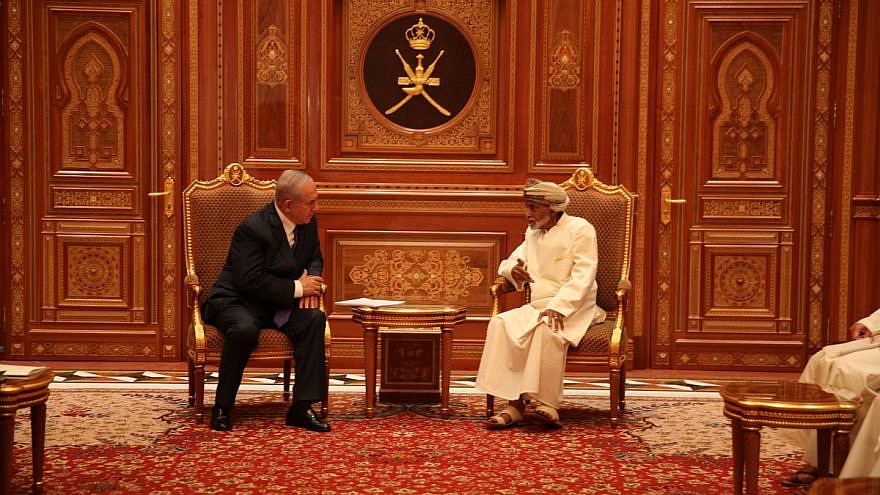Three events in three Arab Gulf states in the past week have reflected these countries’ process of normalization with Israel. On October 26, 2018, Israeli Prime Minister Benjamin Netanyahu visited Oman, accompanied by the head of the Mossad; the visit was extensively covered by Omani media. Omani Foreign Minister Yusuf bin Alawi declared on several occasions that Israel is a Middle Eastern country that must be accepted as such.
On October 25, Israeli Culture and Sport Minister Miri Regev arrived in Abu Dhabi to join the Israeli judo team participating in the Abu Dhabi Grand Slam; while Israelis had previously participated in this competition, it was the first time their national symbols were allowed to be displayed. The Israeli anthem was even played twice when Israeli judokas won two gold medals. During Minister Regev’s stay in the country, she visited the Sheikh Zayed mosque, named for the founder of the UAE.
Prime Minister Netanyahu’s visit to Oman took place a few days after a similar visit by Palestinian Authority President Mahmoud ‘Abbas. Omani Foreign Minister bin Alawi stated that ‘Netanyahu’s visit was aimed at presenting the Israelis with ideas to help renew the political process with the Palestinians, but stressed that his country had no intention of serving as a mediator, since that role was reserved for the U.S. Following Netanyahu’s Oman visit, the Omanis sent several messages to ‘Abbas about it. On October 28, Omani Sultan Qaboos’ envoy Salim bin Habib Al-‘Omeiri arrived in Ramallah with a letter for ‘Abbas, and three days later, on October 31, ‘Abbas met with the Omani foreign minister, who conveyed to him a “direct message” from the sultan. The London-based Saudi daily Al-Sharq Al-Awsat reported that Oman wanted to play an important role in settling both the Palestinian-U.S. and the Palestinian-Israeli disputes.[1]
Additionally, it has been assessed that Netanyahu’s visit also concerned the issue of Iran. The Omani daily Oman reported that Netanyahu and Sultan Qaboos discussed kickstarting the peace process and also “several issues of shared interest that serve security and stability in the region,”[2] perhaps hinting at discussions on that subject.
Netanyahu’s visit took place at the same time as the 14th Manama Dialogue regional security summit was held in the Bahraini capital, focusing on the fight against terrorism and the Iranian threat.[3] Iranian MP Javad Karimi Qadosi stated that he had in his possession information on secret negotiations between experts in the Iranian Foreign Ministry and their American counterparts in Oman; however, the Iranian Foreign Ministry denied this.[4]
These events, and particularly the Israeli prime minister’s Oman visit, aroused many reactions in the Arab world. Most of them appeared in articles and cartoons in the Arab press. There were few statements by Arab leaders; so far, the only officials to make them were Saudi Foreign Minister Adel Al-Jubeir and Bahraini Foreign Minister Khaled bin Ahmad Aal Khalifa. At a joint press conference on the margins of the Manama summit, Al-Jubeir expressed cautious criticism ofOman’s hosting of Netanyahu, saying that his country had no relations with Israel and that “we maintain that there is no normalization without a peace process and the restoration of the Palestinian rights.”
He stressed that the key to normalization with Israel is progress in the peace process based on the 2002 Arab Peace Initiative.[5] In contrast, his Bahraini counterpart expressed a positive view about Oman’s move, saying: “We do not doubt Sultan Qaboos’ wisdom; he is trying to act for peace and to help resolve the Israel-Palestinian dispute…”[6] Iranian Foreign Ministry spokesmanBahram Qassemi said that the Islamic countries need not allow the Zionist entity to provoke new problems in the region, despite American pressure.[7] Hamas political bureau head Isma’il Haniya stressed that Hamas would continue its armed resistance in order to wipe Israel off the map.
However, despite several articles praising Oman’s position, most columnists in the press– even those reportedly maintaining contacts with Israel – aggressively condemned all recent signs of normalization with it. This may show that normalization is not easily accepted and is seen as a red line.
Those who supported Oman’s hosting of Netanyahu accepted the Omani version of events, according to which the move was aimed at serving Palestinian interests, to advance the peace process with Israel, and to lead to the establishment of a Palestinian state. It was also argued that Israel had proven itself to be an effective factor against Iran’s expansion in the region.
Those who opposed Oman’s move maintained that it was against the Arab Peace Initiative, which stipulates that normalization is contingent upon the end of the Israel-Palestinian conflict. They added that the move had harmed Palestinian interests and constituted surrender to the U.S. desire to impose President Trump’s Deal of the Century on the region – in complete contrast to what the Arab peoples want. They also questioned Oman’s ability to help resolve the Palestinian issue where greater powers had failed to do so.
Read full article at MEMRI.


























